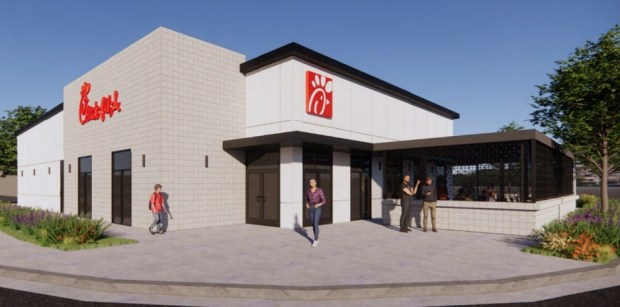Despite significant pushback from housing advocates and neighborhood groups, San Jose planning officials have approved a permit for a new Chick-fil-A restaurant at the corner of Race and West San Carlos Streets.
Related Articles
-
San Jose rejects tower project near Valley Fair that residents called a ‘monstrosity’
-
San Jose hotel complex with hundreds of rooms flops into loan default
-
Two East Bay hotels file for bankruptcy
-
Long-closed Burbank Theater in San Jose may be preserved, gain new purpose
-
Walmart tech unit signs South Bay office lease in Sunnyvale
The Chick-fil-A proposal will revitalize a primarily vacant lot and add a one-story, 5,139-square-foot restaurant that does not feature a drive-thru.
“The corner is blighted and inactive,” said Christine Cho, a representative with Chick-fil-A’s west region development team. “It’s primarily a parking lot with minimal landscaping, cracked pavement, generally in poor condition, with limited pedestrian connectivity and walkability.”
Before the Chick-fil-A proposal came forward, developers had eyed different uses for the 1.1-acre lot for several years but ultimately saw those projects scuttled.
Several years ago, plans for a 230-unit, multi-story, mixed-use development were announced but fell through within months due to significant economic issues. In 2021, developers eyed another quick-service restaurant proposal before opting out.
At a previous community meeting, real estate advisors noted that national retail or restaurant chains were better positioned to handle development risk and stress.
However, for housing advocates and residents from the nearby neighborhood, the addition of another fast-food restaurant held little value because it did not align with the existing urban village plan’s vision and would replace businesses like Taqueria Eduardo.
“It’s disingenuous for Chick-fil-A to claim it is bringing jobs when they’re eliminating existing ones,” resident Eric Ries said.
Another point of contention with the project is that housing advocates and residents felt it was neither pedestrian-friendly nor did it promote walking and the use of public transportation.
“Chick-fil-A told us back in March they cannot succeed in this location without making substantial space for car traffic,” resident Rachel Kumar said. “They’re telling us they cannot succeed as a business in a pedestrian-friendly urban village setting. They’re going to be a source of constant traffic.”
Catalyze SV Executive Director Alex Shoor added that, in addition to violating the general plan and failing to meet the principles of the urban village plan, he felt the project would set the city back and pleaded with the developer to come back with a mixed-use proposal.
The project had faced strong pushback from its inception.
Before the hearing on Wednesday, all but five comments had opposed the development. Residents also circulated a change.org petition that received over 3,200 signatures.
“I just find it unbelievable and outrageous that this proposal has reached the stage that it has reached,” resident David Moore said. “It’s some kind of Orwellian bizarre universe where staff are following the prescribed steps and conclude that it’s consistent with the general plan and a vision of creating urban villages … this is displacing local minority-owned businesses that we should be championing.”
A representative from the Zotto Family Trust, the owners of the property, however, disputed that the existing businesses were not aware of plans to redevelop the site, even before the Chick-fil-A proposal was made, and absolved the fast-food retailer of any blame.
Tom Spilsbury, who has represented the property owners since 2010, stated that Taqueria Eduardo had signed a document in 2020 acknowledging the need to relocate and had paid discounted rent on a month-to-month basis that he said amounted to hundreds of thousands of dollars in savings.
“Chick-fil-A is not suddenly displacing this business at all,” Spilsbury said. “Over the last five years, we have pursued a mixed-use project and other service restaurants. Whether or not this particular development is approved, (Taqueria Eduardo) will not be offered a long-term lease and will still need to relocate, no matter what.”
Spilsbury added that remodeling the existing building, which needed upgrades to the roof, restrooms and several other elements, was not feasible while still maintaining parking for a single-tenant user.
While many claimed the proposal was inconsistent with the urban village plan, hearing officer Sylvia Do disagreed, noting that residential uses are not required and do not require a specific minimum intensity of use.
Although she approved the site development permit, Do also denied the demolition of the existing building.
“Hopefully, this redevelopment will help be a catalyst for continued development along this West San Carlos corridor and help transform it in a way that’s more consistent and creates a place-making urban village as envisioned by the urban village plan since it’s located near transit in downtown,” Do said.

